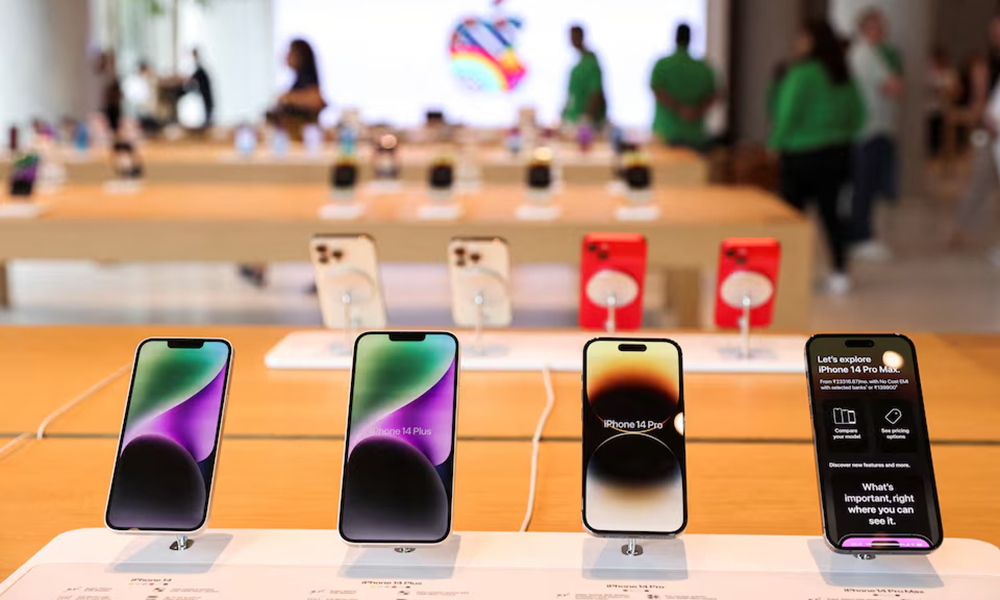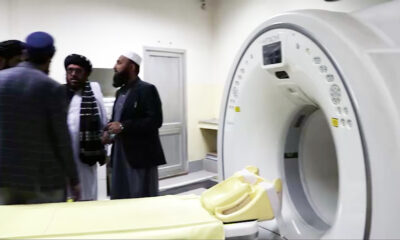Science & Technology
TikTok tells U.S. lawmakers it does not give information to China’s government

An executive at TikTok faced tough questions on Tuesday during the video-sharing app’s first appearance at a U.S. congressional hearing, saying it does not give information to the Chinese government and has sought to safeguard U.S. data, Reuters reported.
Senators at the hearing also voiced concerns that TikTok, owned by Beijing-based internet technology company ByteDance, and rivals YouTube, owned by Alphabet Inc , and Snapchat have algorithms that can be harmful to young people.
Michael Beckerman, TikTok’s head of public policy for the Americas, became the company’s first executive to appear before Congress, testifying to a subcommittee of the Senate Commerce Committee. Republicans in particular pressed Beckerman on worries regarding TikTok’s stewardship of data on the app’s users.
Senator Marsha Blackburn, the panel’s top Republican, said she is concerned about TikTok’s data collection, including audio and a user’s location, and the potential for the Chinese government to gain access to the information. Blackburn questioned Beckerman on whether TikTok could resist giving data to China’s government if material were to be demanded, read the report.
“We do not share information with the Chinese government,” Beckerman responded.
Under questioning by Republican Senator Ted Cruz, Beckerman said that TikTok has “no affiliation” with Beijing ByteDance Technology, a ByteDance entity at which the Chinese government took a stake and a board seat this year.
According to the report Beckerman also testified that TikTok’s U.S. user data is stored in the United States, with backups in Singapore.
“We have a world-renowned U.S. based security team that handles access,” Beckerman said.
Republican Senator John Thune said TikTok is perhaps more driven by content algorithms than even Facebook, as the app is famous for quickly learning what users find interesting and offering them those types of videos.
Beckerman said TikTok would be willing to provide the app’s algorithm moderation policies in order for the Senate panel to have it reviewed by independent experts, Reuters reported.
Executives from YouTube and Snapchat also testified. In a show of bipartisanship, senators of both parties, including Democratic panel chairman Richard Blumenthal, accused the three companies of exposing young people to bullying and sometimes steering them to information that encouraged harmful behaviors such sexualized games or anorexia.
According to the report the executives responded that their companies have sought to create a fun experience and to exclude dangerous or unsavory content.
Republican former President Donald Trump had sought to bar TikTok – a popular platform used by millions of Americans to post short videos – from U.S. app stores, saying it collected data from American users that could be obtained by China’s government and posed a threat to U.S. national security.
Democratic President Joe Biden later revoked Trump’s plan, but sought a broader review of various foreign-controlled apps, Reuters reported.
Science & Technology
Apple loses top phonemaker spot to Samsung as iPhone shipments drop, IDC says

Apple’s (AAPL.O), opens new tab smartphone shipments dropped about 10% in the first quarter of 2024, hurt by intensifying competition by Android smartphone makers aiming for the top spot, data from research firm IDC showed on Sunday.
Global smartphone shipments increased 7.8% to 289.4 million units during January-March, with Samsung (005930.KS), opens new tab, at 20.8% market share, clinching the top phonemaker spot from Apple, Reuters reported.
The iPhone-maker’s steep sales decline comes after its strong performance in the December quarter when it overtook Samsung as the world’s No.1 phone maker. It’s back to the second spot, with 17.3% market share, as Chinese brands such as Huawei gain market share.
Xiaomi, one of China’s top smartphone makers, occupied the third position with a market share of 14.1% during the first quarter, read the report.
South Korea’s Samsung, which launched its latest flagship smartphone lineup – Galaxy S24 series – in the beginning of the year, shipped more than 60 million phones during the period.
Global sales of Galaxy S24 smartphones jumped 8%, compared to last year’s Galaxy S23 series during their first three weeks of availability, data provider Counterpoint previously said.
In the first quarter, Apple shipped 50.1 million iPhones, down from 55.4 million units it shipped same period last year, according to IDC.
Apple’s smartphone shipments in China shrank 2.1% in the final quarter of 2023 from a year earlier.
The drop underscores the challenges facing the U.S. firm in its third biggest market, as some Chinese companies and government agencies limit employees’ use of Apple devices, a measure that mirrors U.S. government restrictions on Chinese apps on security grounds.
The Cupertino, California-based company in June will hold its Worldwide Developers Conference (WWDC), where it will highlight updates to the software powering iPhones, iPads, and other Apple devices.
Investors are closely watching for updates on artificial intelligence development at Apple, which has so far spoken little about incorporating the AI technology into its devices. The company earlier this year lost the crown as the world’s most valuable company to Microsoft (MSFT.O), opens new tab, Reuters reported.
Science & Technology
China launch of relay satellite Queqiao-2 for lunar probe mission successful

China National Space Administration (CNSA) said on Friday its launch of a key signal relay satellite was a “complete success” and it would serve as the communication bridge for its future lunar probe missions for years to come, state media reported.
China launched the satellite Queqiao-2, which was named after a mythological bridge made of magpies, and two miniature satellites, Tiandu-1 and Tiandu-2, on March 20.
Queqiao-2 will be used as a communications bridge between the ground operations on earth and upcoming lunar probe missions on the far side of the moon until at least 2030.
The moon’s near side always faces earth. That means data transfers from the far side are impossible because there is no direct line of sight.
Queqiao-2 researcher and developer Xiong Liang described the satellite as “the main switch” of the whole fourth phase of lunar missions, according to state television CCTV.
“Only when the main switch is flipped on, all the communications can kick off,” Xiong said.
Queqiao-2 will orbit the moon and relay signals to and from the Chang’e-6 mission, which expected to be launched in May. The robotic Chang’e-6 probe will seek to retrieve samples from an ancient basin, acquiring lunar material from the moon’s hidden side for the first time.
Queqiao-2 will also be used as a relay platform for the Chang’e-7 lunar mission in 2026 and the Chang’e-8 mission in 2028.
The functions and performance of Queqiao-2 met mission requirements and it will be able to provide relay communication services for China’s lunar exploration projects and future lunar missions for China and other countries, said the CNSA, according to CCTV.
Queqiao-2 entered its targeted elliptical orbit on April 2 after a correction midway, near-moon braking and orbital manoeuvre around the moon, CNSA said.
The satellite has successfully communicated with Chang’e 4, which was the first spacecraft to perform a soft landing on the far side of the moon and is still carrying out its exploration mission. It also communicated with the Chang’e-6 probe while it is still on the ground earlier this month.
The successful launch of Queqiao-2 comes after the failed launch of another lunar spacecraft DRO-A/B satellites, which was intended to enter the moon’s distant retrograde orbit (DRO).
China has not released any information on whether or not the satellites can be retrieved.
(Reuters)
Science & Technology
Russia aborts planned test launch of new heavy-lift space rocket

Russian space officials on Tuesday aborted the test launch of a new heavy-lift rocket from its far-eastern launch pad.
The Angara-A5 rocket was scheduled to lift off from the Vostochny space launch facility at 0900 GMT Tuesday, but the launch was aborted two minutes before, AP reported.
Yuri Borisov, head of Roscosmos state space corporation, said the automatic safety system canceled the launch after registering a flaw in the oxidizer tank pressurization system.
He said the next launch attempt was set for Wednesday.
Tuesday’s launch was to be the fourth for the Angara-A5, a heavy-lift version of the new Angara family of rockets that has been developed to replace the Soviet-designed Proton rockets.
-

 World5 days ago
World5 days agoUN Security Council to vote Friday on Palestinian UN membership
-

 Business4 days ago
Business4 days agoCommerce ministry inks 10 MoUs to boost development of small and medium-sized businesses
-

 Sport4 days ago
Sport4 days agoRashid Khan threatens BBL pullout after Australia postpones Afghanistan T20I series
-

 Latest News5 days ago
Latest News5 days ago2023 marred by ‘tremendous challenges’ for Afghanistan
-

 Sport5 days ago
Sport5 days agoAfghanistan loses 3-1 to Iran in Futsal Asian Cup match
-

 Latest News4 days ago
Latest News4 days agoOver 6,000 acres of land cleared of poppies in Badakhshan
-

 Health5 days ago
Health5 days agoBalkh health officials report sharp increase in number of cancer patients
-

 Latest News4 days ago
Latest News4 days agoMSF ‘deeply concerned’ over new phase of deportations of Afghans from Pakistan
























